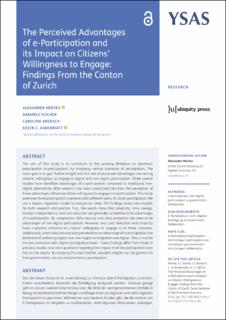Please use this identifier to cite or link to this item:
https://doi.org/10.21256/zhaw-27442Full metadata record
| DC Field | Value | Language |
|---|---|---|
| dc.contributor.author | Mertes, Alexander | - |
| dc.contributor.author | Fischer, Damaris | - |
| dc.contributor.author | Brüesch, Caroline | - |
| dc.contributor.author | Andermatt, Kevin C. | - |
| dc.date.accessioned | 2023-03-27T12:36:40Z | - |
| dc.date.available | 2023-03-27T12:36:40Z | - |
| dc.date.issued | 2022 | - |
| dc.identifier.issn | 2632-9255 | de_CH |
| dc.identifier.uri | https://digitalcollection.zhaw.ch/handle/11475/27442 | - |
| dc.description.abstract | The aim of this study is to contribute to the growing literature on electronic participation (e-participation), by analysing various scenarios of participation. The main goal is to gain further insight into the role of perceived advantages concerning citizens’ willingness to engage in digital and non-digital participation. While several studies have identified advantages of e-participation compared to traditional, non-digital alternatives, little research has been conducted into how the perception of these advantages influences citizen willingness to engage in e-participation. This study examines three participation scenarios with different levels of citizen participation. We use a logistic regression model to analyse our data. The findings reveal new insights for both research and practice. First, the results show that simplicity, time savings, location independence, and cost reduction are generally considered to be advantages of e-participation. By comparison, data security and data protection are seen to be advantages of non-digital participation. However, only cost reduction and simplicity have a positive influence on citizens’ willingness to engage in all three scenarios. Additionally, when data security was perceived as an advantage of e-participation, the likelihood of preferring digital over non-digital participation was higher. This is true for the two scenarios with higher participation levels. These findings differ from those in previous studies and raise questions regarding the impact that the participation level has on the results. By studying this topic further, valuable insights can be gained into how governments can use and promote e-participation. | de_CH |
| dc.language.iso | en | de_CH |
| dc.publisher | Ubiquity Press | de_CH |
| dc.relation.ispartof | Swiss Yearbook of Administrative Sciences | de_CH |
| dc.rights | http://creativecommons.org/licenses/by/4.0/ | de_CH |
| dc.subject | E-Partizipation | de_CH |
| dc.subject | Deliberation | de_CH |
| dc.subject | E-government | de_CH |
| dc.subject | E-participation | de_CH |
| dc.subject.ddc | 350: Öffentliche Verwaltung | de_CH |
| dc.title | The perceived advantages of e-participation and its impact on citizens’ willingness to engage : findings from the Canton of Zurich | de_CH |
| dc.type | Beitrag in wissenschaftlicher Zeitschrift | de_CH |
| dcterms.type | Text | de_CH |
| zhaw.departement | School of Management and Law | de_CH |
| zhaw.organisationalunit | Institut für Verwaltungs-Management (IVM) | de_CH |
| dc.identifier.doi | 10.5334/ssas.166 | de_CH |
| dc.identifier.doi | 10.21256/zhaw-27442 | - |
| zhaw.funding.eu | No | de_CH |
| zhaw.issue | 1 | de_CH |
| zhaw.originated.zhaw | Yes | de_CH |
| zhaw.pages.end | 148 | de_CH |
| zhaw.pages.start | 131 | de_CH |
| zhaw.publication.status | publishedVersion | de_CH |
| zhaw.volume | 13 | de_CH |
| zhaw.publication.review | Peer review (Publikation) | de_CH |
| zhaw.author.additional | No | de_CH |
| zhaw.display.portrait | Yes | de_CH |
| Appears in collections: | Publikationen School of Management and Law | |
Files in This Item:
| File | Description | Size | Format | |
|---|---|---|---|---|
| 2022_Mertes-etal_Perceived-advantages-of-e-participation-and-its-impact-on-citizens-willingness-to.engage.pdf | 1.12 MB | Adobe PDF |  View/Open |
Show simple item record
Mertes, A., Fischer, D., Brüesch, C., & Andermatt, K. C. (2022). The perceived advantages of e-participation and its impact on citizens’ willingness to engage : findings from the Canton of Zurich. Swiss Yearbook of Administrative Sciences, 13(1), 131–148. https://doi.org/10.5334/ssas.166
Mertes, A. et al. (2022) ‘The perceived advantages of e-participation and its impact on citizens’ willingness to engage : findings from the Canton of Zurich’, Swiss Yearbook of Administrative Sciences, 13(1), pp. 131–148. Available at: https://doi.org/10.5334/ssas.166.
A. Mertes, D. Fischer, C. Brüesch, and K. C. Andermatt, “The perceived advantages of e-participation and its impact on citizens’ willingness to engage : findings from the Canton of Zurich,” Swiss Yearbook of Administrative Sciences, vol. 13, no. 1, pp. 131–148, 2022, doi: 10.5334/ssas.166.
MERTES, Alexander, Damaris FISCHER, Caroline BRÜESCH und Kevin C. ANDERMATT, 2022. The perceived advantages of e-participation and its impact on citizens’ willingness to engage : findings from the Canton of Zurich. Swiss Yearbook of Administrative Sciences. 2022. Bd. 13, Nr. 1, S. 131–148. DOI 10.5334/ssas.166
Mertes, Alexander, Damaris Fischer, Caroline Brüesch, and Kevin C. Andermatt. 2022. “The Perceived Advantages of E-Participation and Its Impact on Citizens’ Willingness to Engage : Findings from the Canton of Zurich.” Swiss Yearbook of Administrative Sciences 13 (1): 131–48. https://doi.org/10.5334/ssas.166.
Mertes, Alexander, et al. “The Perceived Advantages of E-Participation and Its Impact on Citizens’ Willingness to Engage : Findings from the Canton of Zurich.” Swiss Yearbook of Administrative Sciences, vol. 13, no. 1, 2022, pp. 131–48, https://doi.org/10.5334/ssas.166.
Items in DSpace are protected by copyright, with all rights reserved, unless otherwise indicated.